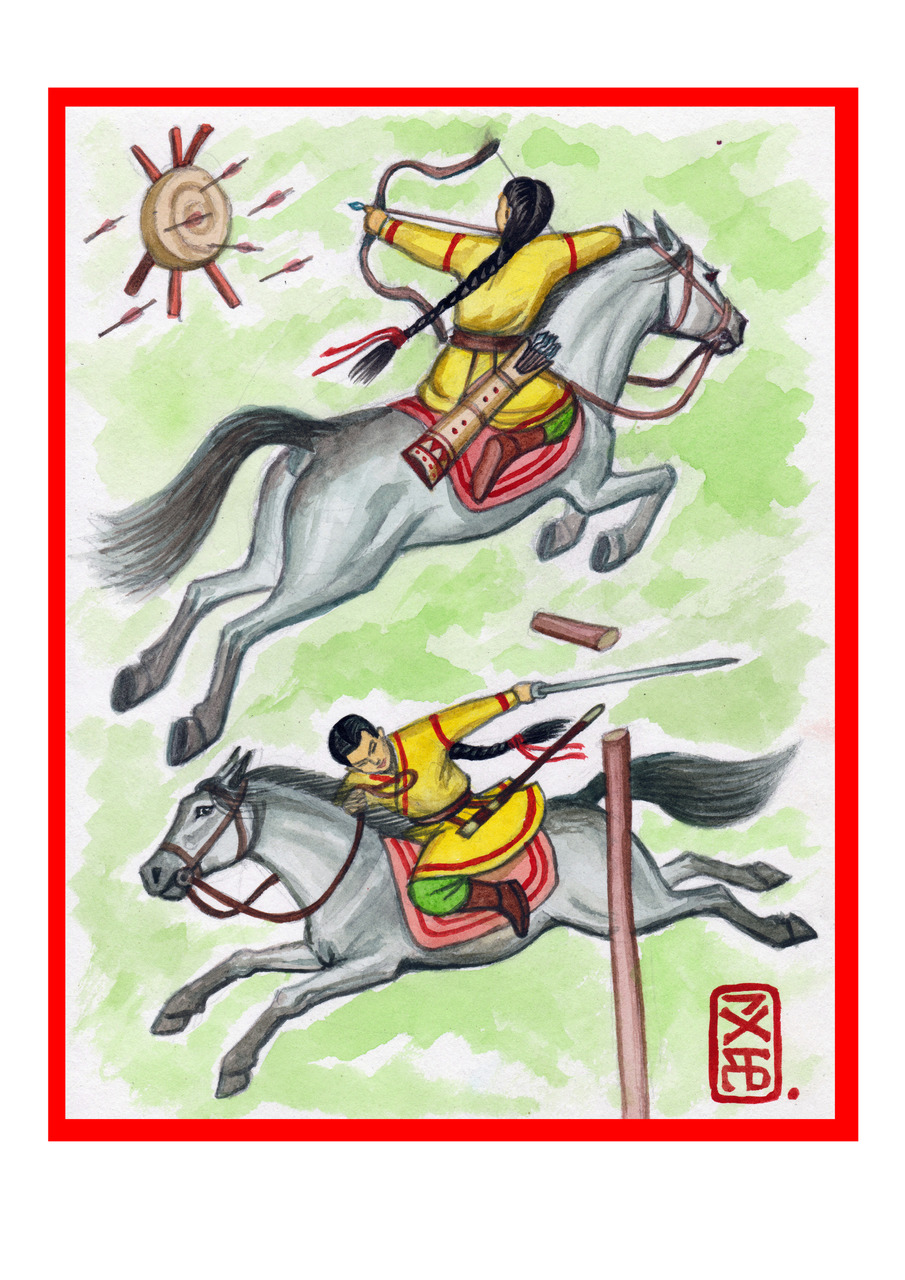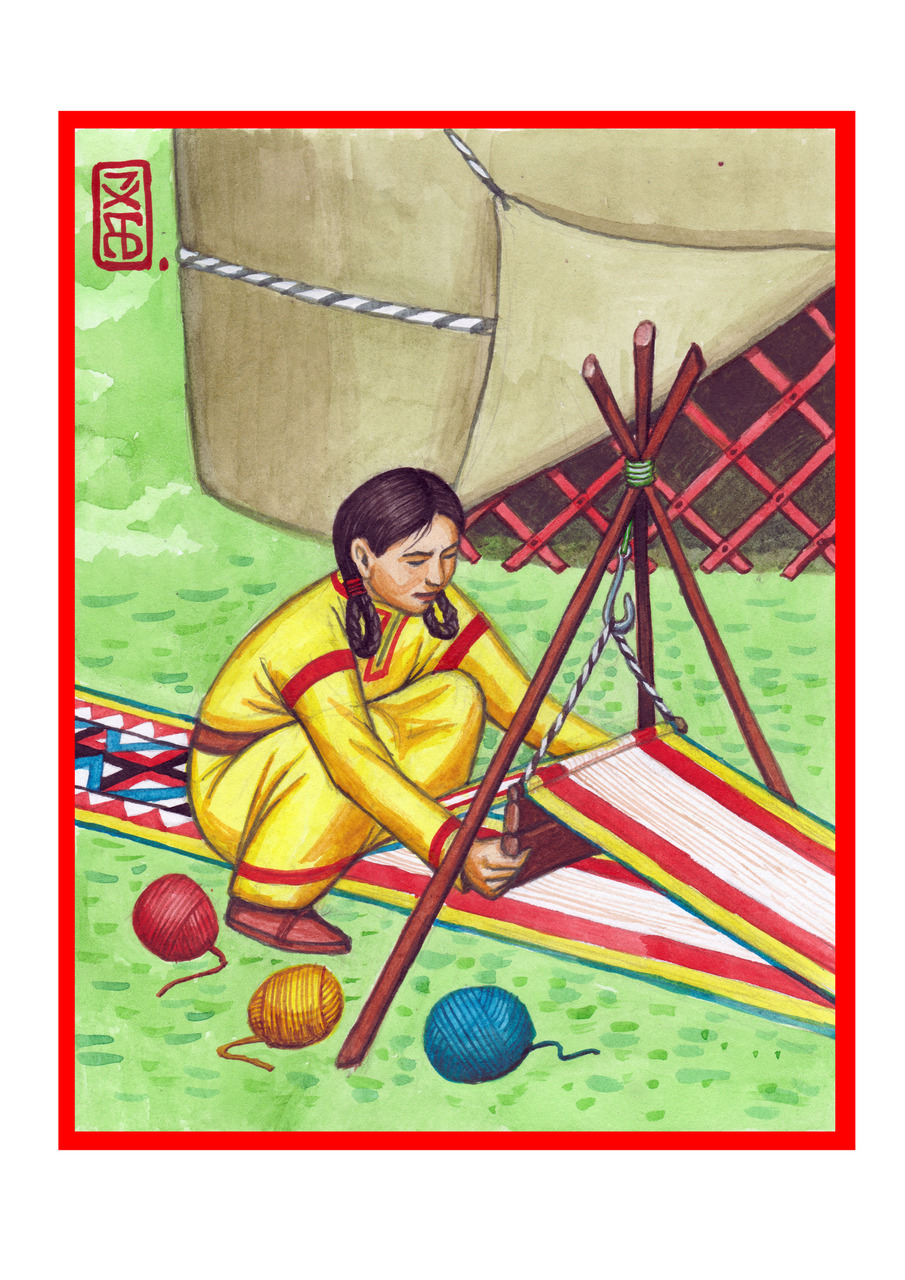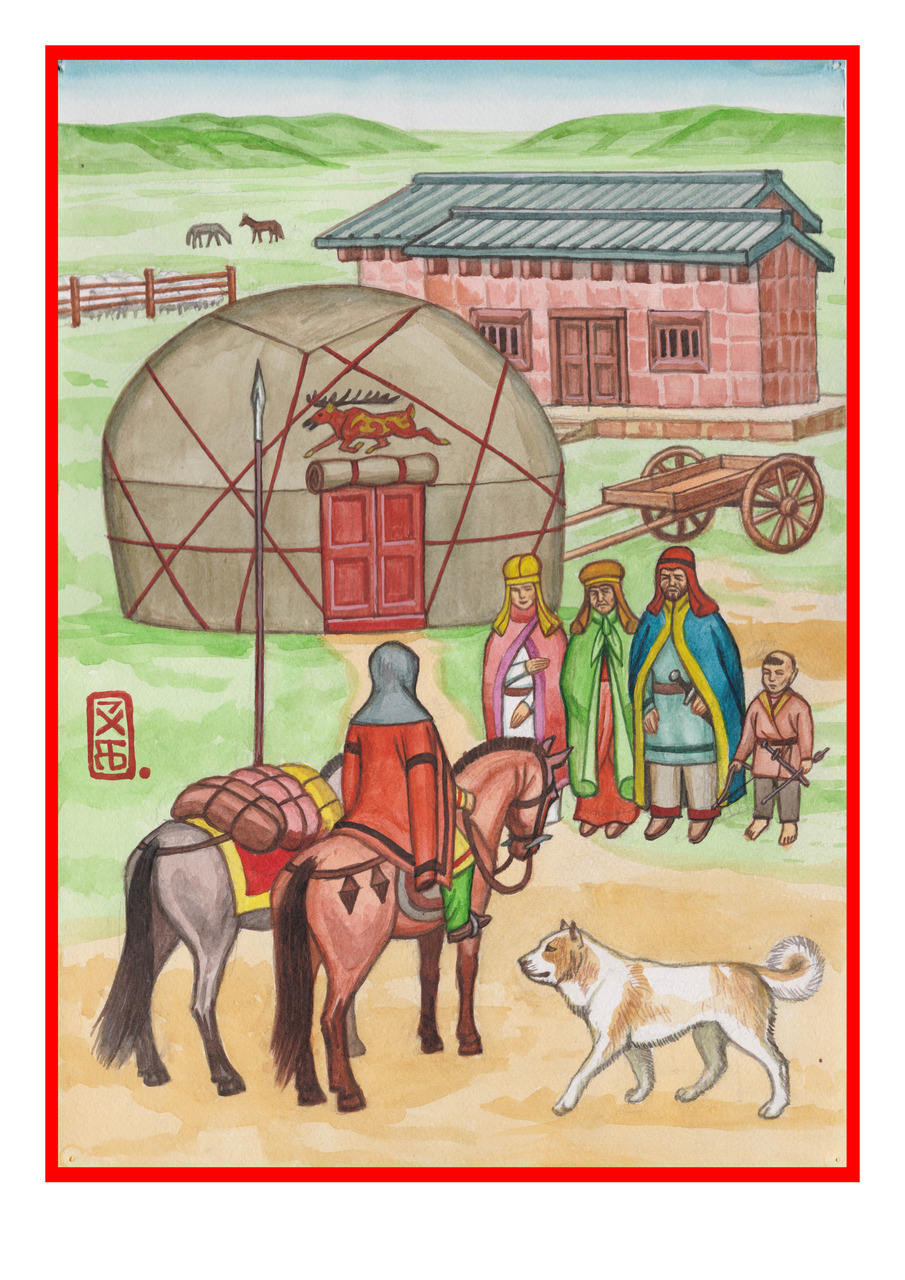
MULAN-BATYR
THE TRUE STORY
This happened long-long time in the Tuoba Wei Khanate of the Great Eurasian Steppe. The people of this khanate had a tribal name of Tabgachi, which means “people who braid their hair”, because both Tabgachi men and women had this traditional nomadic hairstyle.
Among the Tabgachi, there was one honorable tribe called Bulan. The named Bulan means “deer”, because the ancestors of the Bulan people were deer-breeding nomads of the Altai Region. Their insignia called Tamga was a beautiful deer with long antlers.
All men from the Bulan Tribe served in the Tabgachi Khans’ cavalry for many generations. They helped to defend the Tuoba Wei country from the northern nomads and this service was the considered the highest honor.
One old man of the Bulan Tribe had a sixteen year old daughter. Her name was Mulan, and everybody called her Mulan the Bulan. She had an older sister who was a famous local beauty and a little brother.
Mulan’s family lived in the plains north of the Yellow River. Further down north across the plains stood the Yan Mountains, beyond which began the endless plains of the Great Steppe. The nomadic ancestors of the Bulan Tribe were from beyond these mountains too. Back then they lived in mobile yurts and didn’t know anything about living in stationary houses.
But Mulan’s family was semi-nomadic, which means they had a house made of stone and next to it stood a raised traditional Tabgachi yurt. The yurt was an important part of the Mulan’s family household. They used the yurt as a dining hall and to host their guests.

Mulan’s family owned a big herd of sheep, a few horses, and a camel. Sheep provided her family with food and wool. Wool went to making thick felt for their yurt and floor mats, and as a material for threads used in weaving. Horses were their main transportation because nobody liked walking long-distances in these plains. To relocate their mobile yurt, they had to take it down and pack it, and only their mighty camel could carry it from place to place.
The Tabgachi built fenced cattle-pens where they kept their animals when they weren’t grazing in the pastures. When on pastures, the cattle would roam free and eat grass. Neighbors would gather their cattle in large herds and every family would send one member to watch after them. The teams of armed herdsmen would watch after the cattle and protect it from predators and thieves. Mulan, her older sister, and her little brother all have spent many days on the pastures watching after their cattle.
All Tabgachi men and women had to master ancient nomadic martial arts called The Five Weapons. The Five Weapons included the horsebow, spear, sword, battle axe, and dagger. Following this tradition, Mulan’s father taught his children the Five Weapons from a very young age.
Just like the northern nomads, the Tabgachi people were brave and never built high stone walls around their villages. They knew that the best defense against enemies was in their fast bows, long spears, and sharp swords.
If the enemies invaded, the Tabgachi watchmen on the tops of the hills would see them and light fires, signaling everybody about the danger. Then all Tabgachi servicemen would take their weapons, don their armor, hop on their war horses, gather in their military units, and meet the enemy head on.
*****
Our story begins when Mulan the Bulan was sitting in the yurt at her loom, weaving a decoration from the threads that she made from sheep wool. This was a precious ancient nomadic art that her mother taught her, and it was passed from mothers to daughters for thousands of generations.
But Mulan wasn’t thinking about her work. Her thoughts were sad, and because of that she kept sighing and was barely weaving. Sometimes she would stop working completely and her tears would drop on the beautiful woven patterns that she made. If someone could see her, one would think that she was shedding tears over some local boy whom she liked.

In reality, her sorrows were much more serious. Yesterday the Khan’s messenger came to all the villages of the Bulan Tribe and summoned all service-bound men to join a military campaign. The Khan was gathering a big army to fight the invading northern nomads of the Rouran Khaganate who were threatening the Tuoba Wei Khanate with their constraint raids.
The Khan’s messenger had twelve scrolls with names of registered servicemen which included Mulan’s father. Her father was too old to fight so someone had to cover for him, but unfortunately he didn’t have an older son who could take his place. Mulan only had an older sister and a young brother and the older sister was already arranged to marry soon. This meant that only Mulan could cover for her father.
It was decided during the family meeting that Mulan would take her father’s place. She had to leave the life she loved, her family, and her friends to go to war. And that is why Mulan was sighing and crying so bitterly.
******
The next day Mulan’s father gave her money and she went to a market to buy herself a war horse. She found herself a good stallion who wasn’t too big, but was sturdy, powerful, and well-trained for war. She also bought herself a new saddle, bridle, and a long heavy whip.
At home she prepared her leather body armor and helmet, bow and three quivers full of arrow, her sword, spear, battle axe, and dagger. Her family helped her to pack food and warm clothing. Mulan was all set to go. All Tabgachi warriors had to arrive to the Khan’s summons fully equipped and armed.
The next morning Mulan had put on her pants, shirt, and long nomadic coat. She then put on high nomadic boots made of thick leather. She tied a belt with an attached dagger and sword to her waist. She tied the quiver and bow holster to her belt.

She put thirty arrows in her quiver and a horsebow into her bow holster. She tied a long warm cape on top of her clothes. She wore her traditional Bulan headwear with a rounded top. She was ready to go.
Her family awaited outside. Two horses were ready to go: one saddled for Mulan, another packed with her war equipment. It was time to leave. Mulan hugged her father and mother, then her sister and brother. The Tabgachi didn’t like shedding tears, but it was hard for all of them to hold their feelings and they silently wiped their watery eyes.
Mulan hopped on her horse and took off. She rode a few steps, stopped, and then turned around. She took a look at her old father and mother, beautiful older sister, and her funny little brother.
She saw their stone house, round-domed yurt, cattle-pen, and a few trees growing around. She looked at the big wide plain surrounding the village, and the hills far away. She tried to memorize it for the last time. Then Mulan turned around and rode to war, without looking back. Her parents didn’t call after her.
Will she ever come back home? Or will the war swallow her like it swallows so many young lives?
Бесплатный фрагмент закончился.
Купите книгу, чтобы продолжить чтение.